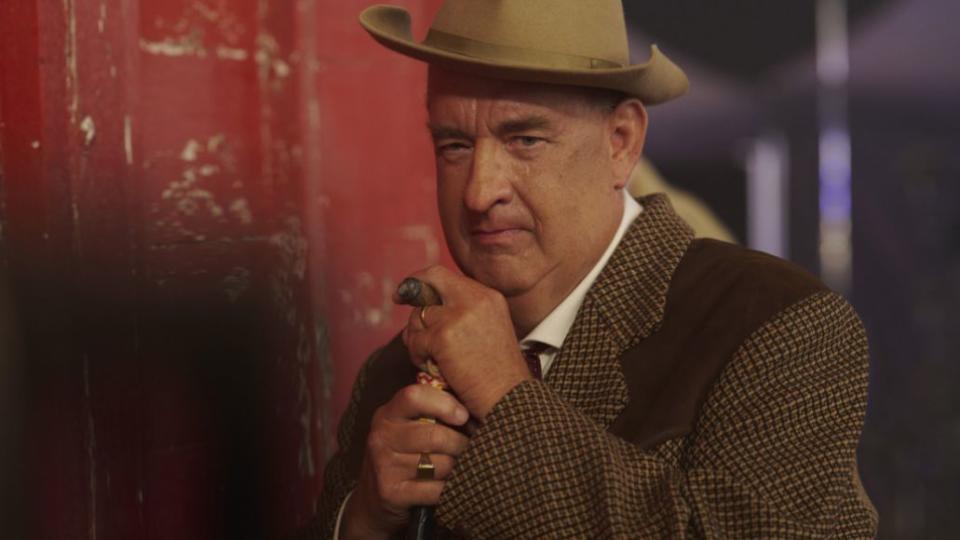Elvis Review: Baz Luhrmann’s First Biopic Is Not As Absurd and Ahistorical As You Might Expect
- Oops!Something went wrong.Please try again later.
- Oops!Something went wrong.Please try again later.
- Oops!Something went wrong.Please try again later.
The post Elvis Review: Baz Luhrmann’s First Biopic Is Not As Absurd and Ahistorical As You Might Expect appeared first on Consequence.
The Pitch: Baz Luhrmann, the Australian maximalist behind such audaciously stylized films as Moulin Rouge! and The Great Gatsby, has taken on his first biopic, and it’s a monster. Although a few attempts have been made at dramatizing the life story of Elvis Presley, most notably Kurt Russell in John Carpenter’s 1979 film also titled Elvis, Luhrmann’s movie is by far the biggest and boldest yet, with an $85 million budget dwarfing every other Presley biopic combined.
Austin Butler, a 30-year-old actor who made his name with several teen and tween-friendly TV roles on the Disney Channel and The CW, is the unlikely star of this massive biography of the King of Rock’n’Roll. An Anaheim native whose most prestigious previous project was a small role as a member of the Manson Family in Once Upon A Time In Hollywood, Butler beat out far bigger names like Miles Teller and Harry Styles to land the role of a lifetime. And in Elvis, he undergoes an impressive transformation into the kid from Tupelo, Mississippi who changed popular music forever.
Tom Hanks plays Colonel Tom Parker, the manager who engineered Presley’s rise to global fame in the 1950s, but was widely accused of financial malpractice and a general disregard for Presley’s best interests, leading to the singer’s untimely death in 1977. Parker is both the story’s villain and its unreliable narrator, and we largely see the story through his eyes, even as the screenplay, co-written by Luhrmann, unsubtly reminds us over and over not to trust his account.
All Shook Up: Even the most celebrated music biopics, from Bohemian Rhapsody to The Doors, have been taken to task for playing fast and loose with the facts. But when Baz Luhrmann was hired to tell Elvis Presley’s life story in 2014, it was clear that historical accuracy was not the top priority.
A year earlier, the marketing firm Authentic Brands Group had purchased the rights to Presley’s image and intellectual property, with an eye on making Elvis hip and profitable with a new generation of consumers. And Luhrmann, whose melodramatic and music-filled films have spun off multi-platinum soundtrack albums for Moulin Rouge! and William Shakespeare’s Romeo + Juliet, was a shrewd choice to assist in that mission.

Elvis (Warner Bros.)
To Luhrmann’s credit, Elvis is a far more straightforward and factually accurate film than it had to be. The Get Down, Luhrmann’s very expensive 2016 series about the birth of hip-hop that Netflix canceled after one season, turned 1970s South Bronx into a sort of mythical b-boy paradise. But Elvis, though it retains the director’s dreamlike signature tone and prioritizes emotion and iconography over straightforward storytelling, is in most respects a pretty conventional biopic that distorts or omits far less than Bohemian Rhapsody did.
Elvis stumbles out of the gate with some of Luhrmann’s gaudiest and most regrettable choices in the first half hour. We first see Butler’s Presley not as a young pop star but as a paunchy thirtysomething in Vegas. And we meet Colonel Tom Parker, who outlived Presley by two decades, in his twilight years, haunting casinos with a morphine drip and argumentatively relitigating his complicated legacy with you, the audience.
Once we finally really start the story, with Parker discovering Presley at the Louisiana Hayride, Luhrmann treats us to an absurdly over-the-top origin myth. Girls begin losing their minds with lust within seconds of hearing Presley sing, as if they’re all about to turn into werewolves. “Baby Let’s Play House” suddenly has a roaring arena rock guitar solo that sounds more like Led Zeppelin than anything that was on an Elvis Presley record in 1955. (It’s by far the worst scene in the film, and of course, it’s also heavily featured in every trailer.)
After that embarrassing display, though, Luhrmann dials it down and makes more judicious use of his flair for heightened reality. Since we largely see Presley through Parker’s eyes, the brief depiction of the singer’s life before they met feels appropriately disconnected from the rest of the story. His childhood is shown partially animated in the style of the comic books that Presley read, and child actor Chaydon Jay plays a young Elvis wearing a lightning bolt logo on a necklace in homage to his favorite superhero, Captain Marvel Jr.
A movie that squeezes 20 very eventful years into two and a half hours has to pick and choose what to focus on. And Elvis builds great sequences out of Presley’s early touring days, his 1968 “comeback” TV special, and his casino residency — yes, Baz Luhrmann and Elvis in Vegas in a white jumpsuit were truly made for each other.
But Elvis breezes past key moments of Presley’s story surprisingly quickly. Presley saying the words “Sam Phillips discovered me” are just about all we get about the producer and Sun Records founder’s massive role in his career. In a blink of an eye, we go from summer 1956 to spring 1958, passing over Presley’s transition to movie stardom and iconic moments like Jailhouse Rock, and then his two years in the U.S. Army are quickly skipped over as well.
And Presley’s relationship with Priscilla Beaulieu, who was 14 when she first met the 23-year-old pop star, is given little scrutiny or detail until their marriage starts to deteriorate in the ‘70s — this movie is, after all, first and foremost a PR effort endorsed by the Presley estate.
Suspicious Minds: On paper, Austin Butler is Elvis’s big gamble, and Tom Hanks is the sure thing, brought in to help ballast a movie that’s risking an 8-figure budget on a relative unknown. But Butler, who plays Presley from a fresh-faced 20-year-old to an overweight 42-year-old, weeks away from an early death, absolutely carries the film. In early scenes, it seems that his hair and his cheekbones are doing a lot of the work for him. But by the time he makes his late ‘60s comeback, Butler has inhabited Presley to an eerily effective degree. Luhrmann holds Presley at arm’s length, so Butler isn’t asked to depict a rich interior life — he’s mostly Elvis the icon, and he nails it.

Elvis (Warner Bros.)
Instead, Tom Hanks is the movie’s weak link. Parker, who was born Andreas Cornelis van Kuijk in the Netherlands and was secretive about his past after moving to America and changing his name, is a fascinating figure whose importance to the Elvis Presley story cannot be overstated. It’s smart to make him central to the movie, and give that juicy part to a major star.
When a leading man of Hanks’s stature becomes a senior citizen, he often finds himself in mentor roles, billed below younger actors but often outshining them with a more assured and seasoned screen presence. Unfortunately, Hanks is so over-the-top that he’s hard to watch, a slimy and squirming performance that suggests that he perhaps regrets that he never got to play The Penguin in a Batman movie.
The Verdict: Elvis is not the outrageously surreal Baz Luhrmann joint many expected — in a way, Dexter Fletcher’s 2019 Elton John movie Rocketman was closer to what a Baz Luhrmann-style rock biopic could and arguably should be. But Luhrmann’s slightly more restrained style works successfully in service of Butler’s performance, which is sublime in the second half of the movie. Butler is shy and soft-spoken as young Elvis, cocky and charismatic in his prime, and finally helplessly out of touch with reality in Vegas, convincingly living out Presley’s entire tragic arc.
Verging on a hagiography that blames Colonel Parker for everything that went wrong and makes Presley a passive participant in his own career, Elvis is guilty of many of the music biopic clichés that Walk Hard: The Dewey Cox Story so memorably satirized. And when the epilogue text before credits asserts that “Elvis Presley is the best-selling solo artist of all time” and “His influence lives on,” the dutiful brand management of the entire enterprise feels a little too transparent. But Luhrmann and Butler have made a compelling and at times wildly entertaining portrait of Elvis Presley — no thanks to Hanks.
Where To Watch: Elvis is in theaters nationwide on June 24th.
Trailer:
Elvis Review: Baz Luhrmann’s First Biopic Is Not As Absurd and Ahistorical As You Might Expect
Al Shipley
Popular Posts
Tom Hanks Screams at Autograph Hound for Tripping Wife Rita Wilson: "Back the Fuck Off"
12-Year-Old Child Granted Protective Order Against Ezra Miller
Britney Spears' Ex-Husband Crashed Her Wedding, Promptly Tackled by Security
David Koechner Arrested for DUI for Second Time in Six Months
Why Kelly McGillis Isn't in Top Gun: Maverick: "I'm Old and I'm Fat, and I Look Age-Appropriate"
Here's Why Tim Allen Isn't Voicing Buzz in the New Lightyear Movie

